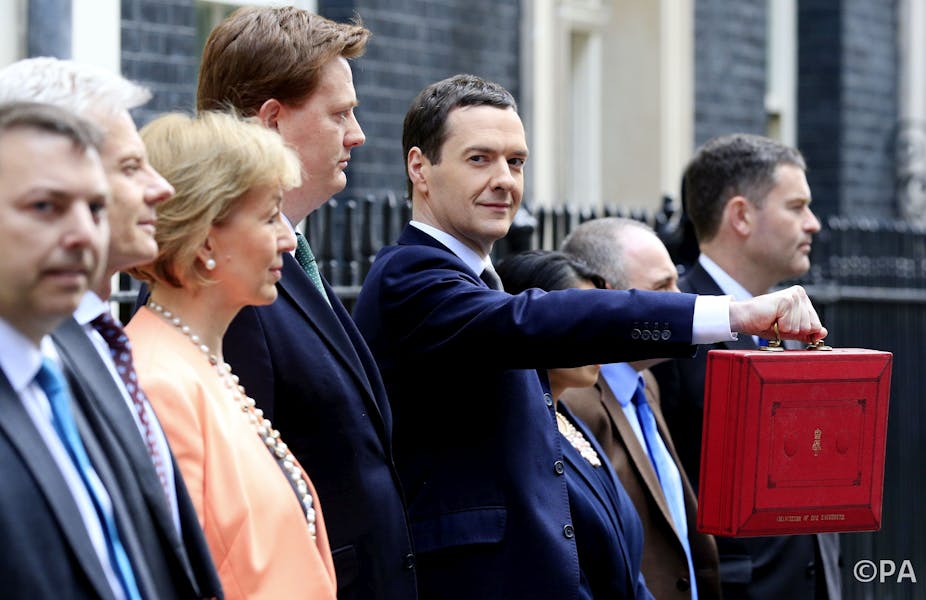As expected, chancellor George Osborne pulled a handful of small rabbits out of his hat as he announced his pre-electoral budget. Lowering the tax allowance, cutting taxes to middle-income earners together with a few give-aways to pensioners, savers, prospective home-buyers, beer drinkers and van drivers are the typical electoral bribes that chancellors of all colours reserve for election years.
It remains to be seen whether this electioneering budget will have an effect on the Conservatives’ position in the opinion polls. It might not win any new supporters but in truth that doesn’t really matter. Osborne’s achievements as a very political chancellor go far beyond winning a few recalcitrant floating voters. If his record as a manager of the national economy is far from stellar, he succeeded in setting the public debate on the deficit and, as a result, he made the political weather.
This is a remarkable feat considering that Osborne’s economic strategy has failed. In 2010 he announced that the main priority of the coalition was to eliminate the public deficit by 2015 and that this would be achieved through a draconian programme of public spending cuts. But that has come to nothing.
By Osborne’s own admission, the government failed to eliminate the public deficit and admitted that it won’t be eliminated before 2018. As a result of Osborne’s spending cuts, the economy actually shrunk in the first three years of the coalition government.
Showing some ideological flexibility, Osborne changed gear in 2013. He mixed cuts (in particular to welfare spending) with a stimulus plan. As a result of these changes and of falling oil prices, the British economy is expected to grow 2.5% this year according to the Office for Budget Responsibility. That said, the squeezes on living standards persist, as do the endemic problems associated with low productivity and an over-reliance on the financial services industry.
Electoral masterstroke
But Osborne has turned a failed economic policy into a political success. While falling short of the deficit targets he set for himself, he managed to set the political debate on the public deficit by forcing Labour to succumb to his austerity narrative.
In this he was assisted by the City of London and by the London-based media who agreed (despite evidence to the contrary) that the only credible policy to eliminate the public deficit was a draconian programme of public spending cuts.
The political consensus on the deficit created huge problems for the opposition. Both Ed Miliband and Ed Balls tried to articulate a Keynesian alternative to the coalition’s austerity. But by 2013 they reluctantly accepted that the party’s economic credibility depended on the acceptance of spending cuts.
Thus, Labour accepted Osborne’s public spending plans and promised to produce a budgetary surplus by the end of next parliament. Balls has even ruled out making electoral proposals for extra capital spending paid for by public borrowing.
As several opinion polls suggest, Labour is paying a heavy electoral price for its endorsement of austerity. The party is haemorrhaging votes to anti-austerity parties like the Greens and, more dangerously, to the SNP in Scotland. Analysis has showed that Labour could lose 22 seats in England as a result of the Green surge and close to 50 seats in Scotland to the SNP.
After forcing Labour to endorse austerity, Osborne used his last budget speech of this parliament to suggest that he is not even that bothered about the deficit. Indeed, he indicated he is ready to relax austerity and to steal some of Labour’s proposals (including on the minimum wage, living standards, regional development, tax avoidance and on the bank levy). This has enabled him to neutralise Labour’s stance that the Conservatives are set to shrink the size of the state to 1930s levels.
This leaves Labour on the defensive again (though Miliband’s reply to the budget showed him in a fighting mood). All of a sudden, Labour’s proposals on the minimum wage, regional development and public sector reform look modest and minimalist.
Considering that the Conservatives are seen by voters as the most effective managers of the economy, Osborne’s last throw of the dice may be just enough to see them win the most seats on May 7.

